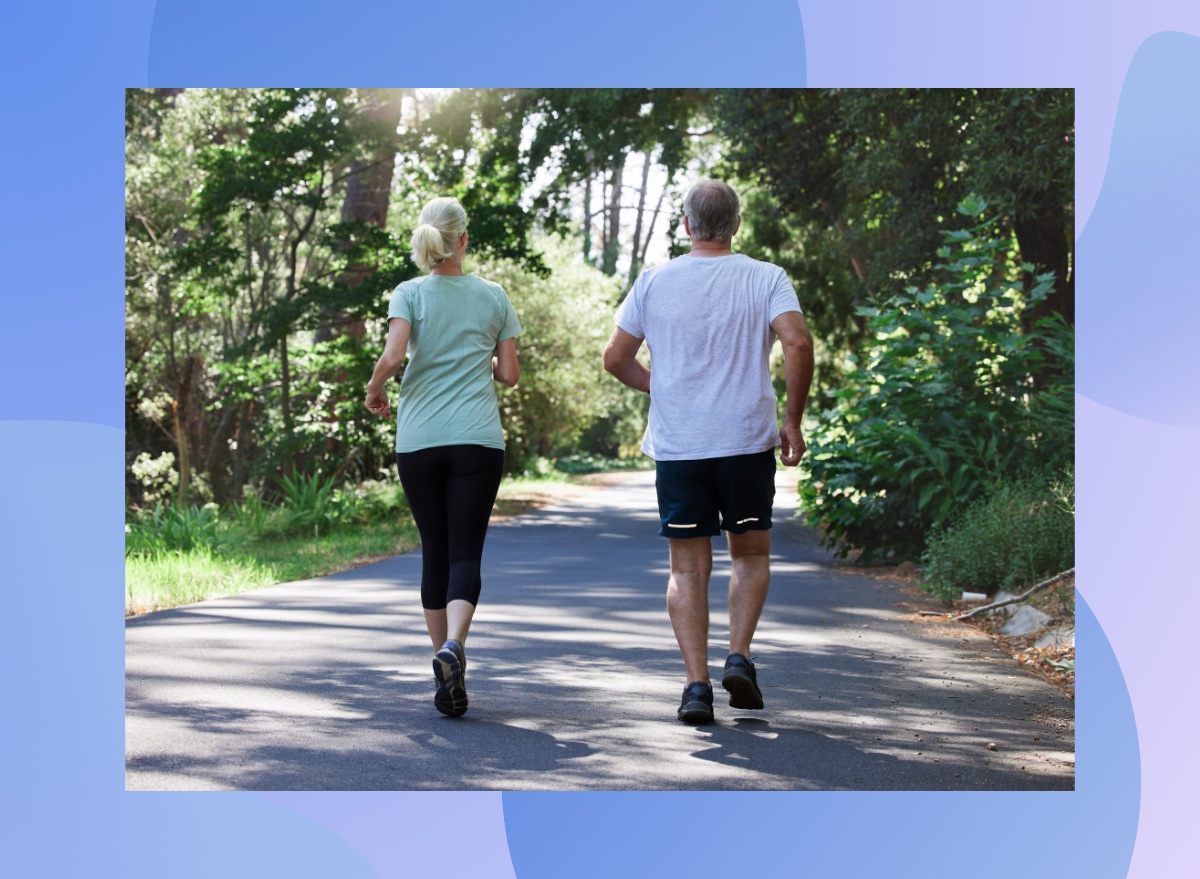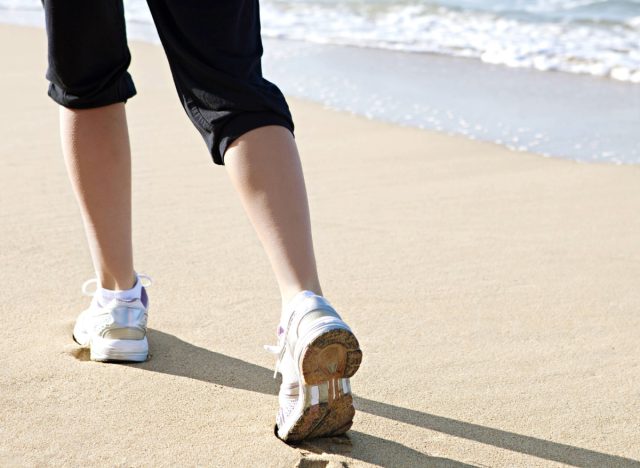Are You Unhappy? Walk This Far Before Breakfast, Says Science

If you ever struggle with prolonged unhappiness—or worse, symptoms associated with depression—there’s no better place to start rectifying matters than at the gym. According to the health experts at the University of Minnesota, adding some more physical activity to your days promotes better mood, more self-confidence, and creates a sense of empowerment.
Research shows that adding a simple walk to your daily routine provides a host of mental health benefits. For example, research conducted at Harvard University and published in JAMA Psychiatry reports that getting in just one hour of walking per day may cut the risk of depressive feelings by over a quarter.
“We saw a 26% decrease in odds for becoming depressed for each major increase in objectively measured physical activity,” says study author Karmel Choi, Ph.D., a clinical and research fellow at the Harvard T.H. Chan School of Public Health. “This increase in physical activity is what you might see on your activity tracker if you replaced 15 minutes of sitting with 15 minutes of running, or one hour of sitting with one hour of moderate activity like brisk walking.”
Moreover, walking helps your mind in more ways than just mood. This study published in the Journal of Experimental Psychology: Learning, Memory, and Cognition found that walking can also help spark a “free flow” of creative thoughts and ideas. Meanwhile, another study published in the British Journal of Sports Medicine found that a 30-minute morning walk helped a group of older adults improve their thinking skills, memory, and mental clarity.
Oh, and speaking of the morning, the AM is a perfect time to get in your daily steps for a number of reasons. Always find yourself groggily reaching for some morning coffee? Research published in Physiology and Behavior reports that as little as 10 minutes of walking in the morning can provide a greater energy boost than a cup of java. Additionally, a study released in the scientific journal Medicine & Science in Sports & Exercise found that a 45-minute brisk morning walk helped participants better resist tempting images of various foods.
So how far should you walk each morning? Per WebMD: “A good rule of thumb is to walk for 30-45 minutes, either all at once or broken into 10-minute chunks. This ends up being about 2-4 miles. You can measure your distance by wearing a watch to measure the time or buckling a pedometer to your belt to measure the distance.”
But let’s face it: If 20 minutes is all you have, that’s better than no walking. But considering the findings previously mentioned from Harvard, if you can extend your daily walks to a full hour, you may be even find them more helpful at boosting your feelings of happiness. For even more ways to make your daily walk even more enjoyable and helpful, read on, because we’ve listed them right here. And for more great walking advice, see here for The Secrets to Walking Your Way to a Longer Life, Say Experts.
Walk to Work

As more and more companies begin opening up their offices to employees once more, you may be feeling pretty bummed about getting back to a daily commute. But, if geographically feasible, walking to your job can be a great way of making your commute work for you.
This study published in the scientific journal Preventive Medicine found walking or cycling to work helps improve both mental health and overall wellbeing. Additionally, “active commuters” showed stronger concentration skills and fewer signs of stress.
“Our study shows that the longer people spend commuting in cars, the worse their psychological wellbeing. And correspondingly, people feel better when they have a longer walk to work,” says lead researcher Adam Martin from The University of East Anglia’s Norwich Medical School. And for more reasons to walk, don’t miss this list of Incredible Things That Happen When You Walk More, Says Science.
Walk in Nature

Nature has been linked to stronger mental health by a number of studies. This one, published in Frontiers in Psychology, even concluded just 10 minutes spent outside around nature significantly helped a group of overworked college students destress. Another research project released just a few months ago in Proceedings of the National Academy of Sciences found that simply taking some time to experience and soak in the sounds of nature can have incredible health benefits. The sounds of water fostered improved positive emotions and health outcomes, and bird sounds helped relieve stress.
Consider getting in your daily steps at a local park or nature reserve. The combination of walking and nature will make it that much more likely you head home with a smile on your face. And for more great tips for taking your walks outside, don’t miss The One Type of Walking You’re Not Doing Enough Of, Says Science.
Walk Along Water

Not everyone lives close to a beach, lake, or river. But if you do, going for walks along the water may help boost the benefits of a daily walk. Researchers tracked a group of participants as they spent a full week walking in an urban area every day for 20 minutes, another week walking along a beach for 20 minutes each day, and a third week spent lounging inside for the same periods.
“We saw a significant improvement in the participants’ well-being and mood immediately after they went for a walk in the blue space, compared with walking in an urban environment or resting,” comments Mark Nieuwenhuijsen, coordinator of the study published in Environmental Research.
Be Kind While Walking

Here’s something to keep in mind on your next stroll: Think kindly and positively about the people you encounter and walk by while out and about. A fascinating study released by the Journal of Happiness Studies asked a group of volunteers to think more deeply, using three strategies, about the people they encountered while walking.
The first approach, called “loving-kindness,” entailed looking at others and thinking “I wish for this person to be happy.” The second was termed “interconnectedness” and involved seeing people and considering how we’re all connected (similar hopes, dreams, etc). Finally, the third approach was more cold, asking participants to only consider other peoples’ outward appearances and looks. Study subjects who had practiced loving-kindness and interconnectedness felt less anxious, happier, more connected, more caring, and more empathetic in comparison to the third experimental group.
“Walking around and offering kindness to others in the world reduces anxiety and increases happiness and feelings of social connection,” says study author Douglas Gentile, professor of psychology at Iowa State University. “It’s a simple strategy that doesn’t take a lot of time that you can incorporate into your daily activities.” And if losing weight is your goal, don’t miss The Secret to Walking Your Way to a Lean Body, Say Experts.